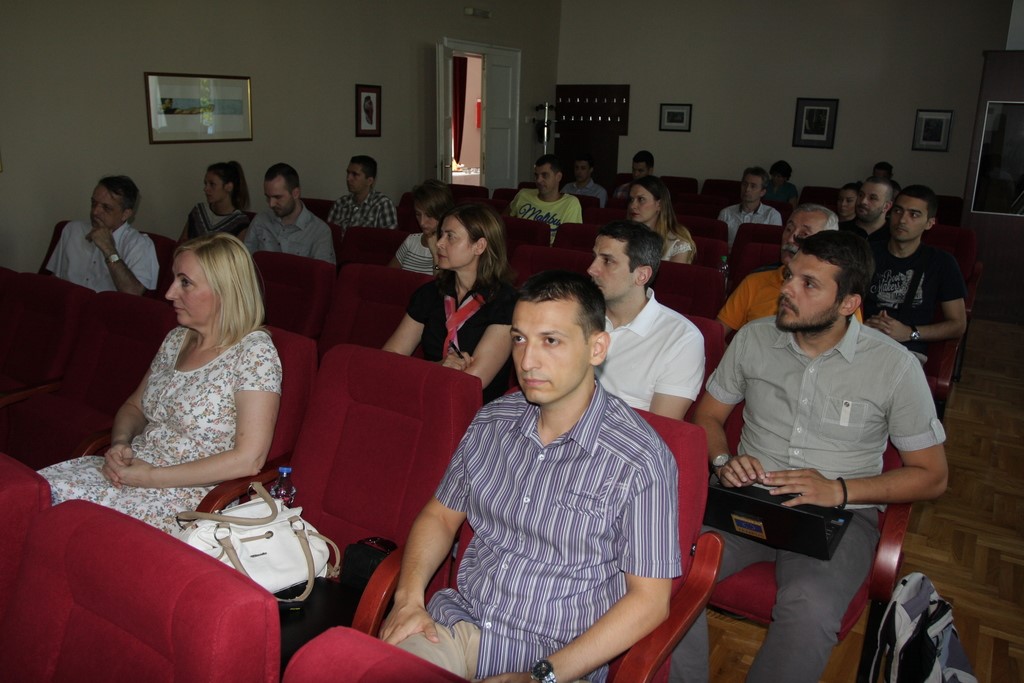Preparation of Educational and Expert Material, 6-8 of July 2016 Banja Luka

Marija Radojičić briefly presented current condition of created courses at Open edX-BAEKTEL platform. It was pointed out on some omissions in created courses. Some solutions were suggested for potential and current problems in creating courses. She presented some additional advantages and options of Open ed-BAEKTEL platform. Also, there was a discussion regarding the lack of some options, and about solutions how to overcome them.
Marija made an overview of current situation at Termi application. She presented some good examples and pointed out on some not very well entries. It was discussed about instructions for adding terms to Termi applications. It was showed connecting between Termi multilingual dictionary and Open edX-BAEKTEL platform. Also, it was discussed about potential improvement of Termi application in purpose of automatization of entering process.
Partners presented their experiences in creating courses and adding terms at Termi application. We was discussed about solutions and corrections of current problems.
Prof. Valerija Šaula welcomed all partners on behalf of the Rector, prof. Mataruga, who was unable to come due to previous commitments. Prof. Šaula briefly talked about the state at the University of Banja Luka in regard to Open Educational Resources, University regulations and innovations induced by OER, first advocated by Faculty of Architecture, Civil Engineering and Geodesy, as part of the BAEKTEL project. She also talked about the benefits of this and other TEMPUS projects, implementing EU trends in developing scientific research work, and an idea to establish an office for assistance in writing applications and managing future projects.
Afterwards each partner had time to talk about the current state of the BAEKTEL project, obstacles encountered and ways to overcome them. Everyone agreed that more effort needs to be put into creating quality OER, after successfully completing previous stages of the project.
Next, Saša Tatar (UBL) talked about the significance of the simplest forms of OER to dissemination and search engine optimization. As he stated, even though edX platform and MOOCs in general offer the best learning experience, the downside is that edX makes it difficult for the search engines to index the created content and hence the only way for a learner to become aware of the content is through the meta data portal. This limitation can be overcome by publishing the content also independently of the edX platform, through separate text and video files containing parts of the MOOC together with references to the entire MOOC content. This technique has been used with great success by some of the commercial content creators, such as Lynda and Udemy. Content creators would publish parts of the content on Youtube and their blogs, which would be more easily discoverable by users who might be interested in the rest of the content or even entirely different publications by the same author. The same approach can be used with OER. This would also serve as a way of disseminating information about the BAEKTEL project, as all of the partial content could include a reference to the project website and a short description.
Aleksandar Borković (UBL) gave some suggestions for University of Banjaluka regarding importance of development of OER. Creation of quality material should increase students' interest in studying at UBL. Official account of UBL at mainstream sites is required (most important is YouTube channel).
Upon the presentation, participants took part in an open discussion and demos, where they further exchanged ideas such as what kind of information should be included as a reference to the project, and where it should be put inside the content (at the beginning of a text document and inside video or image description).
Since many of the partners reported difficulties in choosing the correct Creative Commons license for their content which was created as a derivative of another open resource, the organizers of the training decided to address this issue. Saša Tatar (UBL) briefly explained how to determine which CC license can be applied to a derivative based on the restrictions imposed by the previous author, in order to ensure these restrictions are not breached by our derivative work. The participants were provided with simple to use tables that describe compatibility between different types of CC licenses as well as other open licenses that may have been used. Afterwards all participants took part in an exercise where, based on the example open content they had to determine which license could be applied to a derivative of that content.
As one of the measures to increase discoverability of the created content, Radovan Vukomanović (UBL) briefly presented some guidelines for online content publishing through free internet services such as wordpress.com for blogs, Google Drive for file sharing and hosting and YouTube for video sharing.
Afterwards all participants took part in a demo where they were given a task to create an account for one of the services, upload example content and perform search engine optimization to ensure better discoverability.
A demo was held by Dijana Majstorović (UBL) on how to add subtitles and watermarks to YouTube videos in order to further improve discoverability and visual branding of the content.
Training meeting was concluded with an open discussion followed by Q&A.


